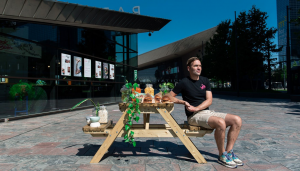If you’re poring over menus these days, you’re probably seeing more leafy-green icons than ever before: plant-based food is a hit. So how do seriously sustainable and ambitious food innovations like Rotterdam fast-food joint Jack Bean connect to food systems change? And what’s working for or against them?
About the bean
Jack Bean is a 100% plant-based fast-food restaurant, with two locations in Rotterdam. The objective of the founders is “to make plant-based food the standard, by focusing on increased affordability and food attractiveness”. They are one initiative among the diverse group of pioneering urban food innovators DRIFT is studying as part of the SIRIUS research project.

This SIRIUS Food Transition Profile shows how this plant-based fast-food restaurant is contributing to the acceleration of plant-based food consumption in two major ways: Firstly, in their role as gastronomy innovator – by reimagining food; and secondly, by acting as an urban food entrepreneur, Jack Bean demonstrates that entrepreneurship and sustainability pair nicely together.
Broader appeal
Although their food may be fast, and their product may be on trend, Jack Bean seems more interested in long-term food systems change than in making money fast with a new spin on an old formula. Besides measuring the environmental footprint of their most popular hamburger, they are also exploring ways to make food delivery more sustainable. In doing so, the company presents as a ’hardcore’ sustainable food alternative, even to consumers who are more casual when it comes to food sustainability (and who might find themselves increasingly confused by the onslaught of sustainability claims and labels).
Driven by sustainability ambitions, Jack Bean intends to market affordable fast food produced according to the strictest sustainability criteria to the general public. This entails not only sourcing sustainably through a combination of local and organic products, but also proving the sustainability of their products to the consumer through calculation of ‘food footprints’.
Gastrono-meatless
Consumers can find themselves bombarded with messages urging them to make more sustainable consumption choices. However, exactly how to put this in practice is often less straightforward. Here is where ‘gastronomy innovators’ can play a crucial role in the broader food system transition, as they help to re-imagine ingredients in a sustainable and culinary sense. If ingredients like bacon, blue cheese or avocado are considered go-to burger toppings, it’s challenging to serve sustainable burgers. As a gastronomy innovator, Jack Bean frequently experiments with new flavours, by testing how local and sustainable produce can be combined to invent new dishes. Jack Bean is showing consumers what every-day sustainable food can look like and how to use plant-based proteins, by developing plant-based takes on meat-based classics.
Jack Bean sets out to confront some major challenges for plant-based food consumption: broadening the customer-base of plant-based products and shedding the image of it being expensive or elitist. Jack Bean will have to work on overcoming this limited socio-economic as well as cultural reach to meet their objectives. It won’t be easy, but it should be tasty.
We will continue to develop SIRIUS Food Transition Profiles as the project continues and more transition-related dynamics insights emerge.
About SIRIUS
We can’t have a sustainable world without sustainable food systems. As part of the SIRIUS project, Aniek Hebinck and Timo von Worth join researchers from Lancaster University, the Institute of Urban Environment Xiamen and the Institute of Ecology and Geography Xinjiang (both Chinese Academy of Sciences) to explore pioneering urban food innovators and how these might contribute to broader food system transformation or sustainability transitions. Read more about this project and DRIFT’s contribution to work package 3 here.
Date
December 17, 2020